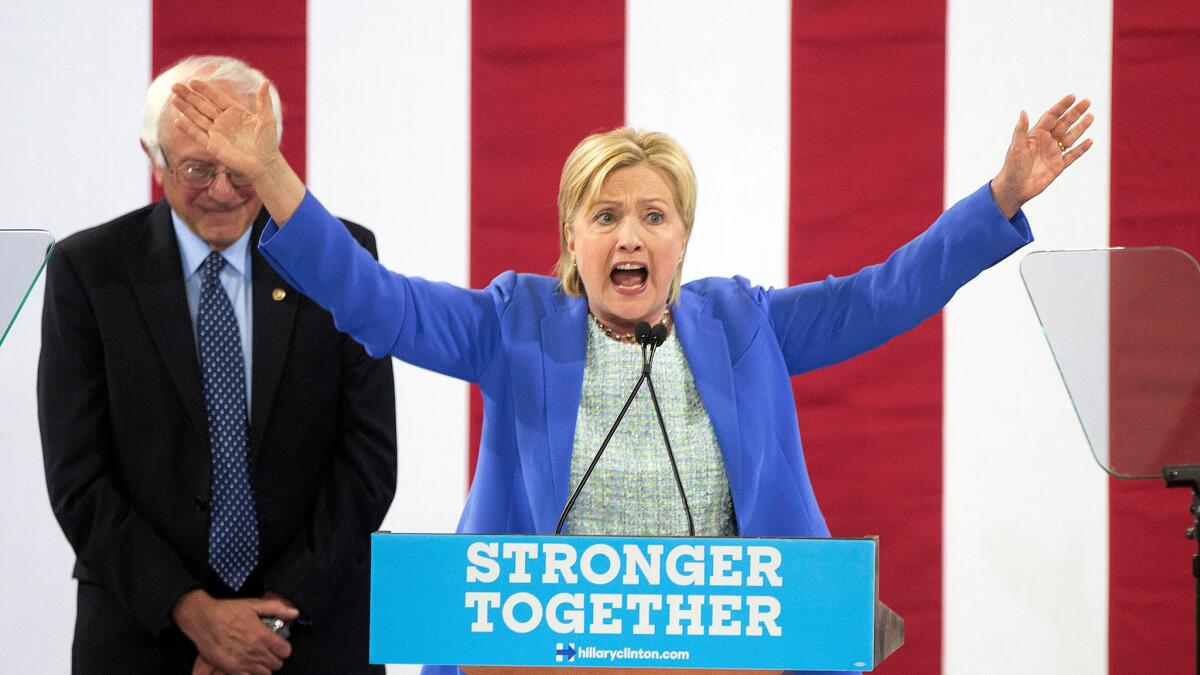Op-Ed: The Democrats just ceded economic justice to Donald Trump

On Tuesday, Jamie Dimon, chairman and chief executive of JPMorgan Chase, announced in a New York Times op-ed that giving a raise to 18,000 of his firm’s employees is “the right thing to do.” Over the next three years, Chase’s current minimum wage of $10.15 per hour will be raised to between $12 and $16.50 an hour, depending on “geographic and market factors.”
“Wages for many Americans have gone nowhere for too long,” wrote Dimon, who apparently thinks nobody will notice that, during the 10 years since he became CEO, he was A-OK with his employees being paid $10.15 per hour until, well, yesterday. Now, Dimon says, he wishes to “create more widely shared prosperity.”
His employees are not going to share prosperity anything like the way he does, though. Dimon himself made $27 million last year, down slightly from his peak compensation of $30 million in 2007. It’s as if Dracula were to announce that henceforth he would be sucking only 98% of the blood from his victims instead of 100% — out of generosity.
It was an especially cruel thing to read Dimon’s piece on the same day that Bernie Sanders endorsed Hillary Clinton. For those who have been watching the Democratic National Committee’s platform debates, it’s eminently clear that Clinton is on Dimon’s side of the income inequality debate, rather than Sanders’. Indeed, Dimon contributed to several of her earlier campaigns; he gave the maximum amount to her presidential run in 2008. He wouldn’t dare contribute openly now, however, what with anti-zillionaire sentiment running as high as it is, and Hillary Clinton badly needing to be seen as a champion of ordinary working people. Just like Donald Trump!
Sanders’ decision to endorse the opponent he had so ably chased and chastised during the primaries was saddening. Better by far for him to have taken the Green Party up on their offer to run him as their candidate, rather than to endorse an opponent so radically inimical to his values. Presumably, this was a concession to pragmatism, a bowing to the inevitable, and an acknowledgement that he had pushed the platform as far in his direction as he could. Perhaps Clinton’s camp made other concessions, as yet unknown.
There are both right-wing and left-wing movements against the encroachment of corporate power in the modern world. Sanders made the case against corporate globalization from the left, and Trump from the right. (Trump is a nationalist, a racist, and an oaf besides, but for the moment we are considering just the anti-globalization aspect of his candidacy.)
Sanders’ decision to endorse the opponent he had so ably chased and chastised during the primaries was saddening.
With Sanders’ endorsement of Clinton, the left-wing anti-corporate-globalization column has been defeated, at least for this election. He is now effectively aligned with what the Trump supporters would call the globalist elite — if not in spirit, then at least on paper. The left side of the partisan spectrum is now officially aligned with Wall Street and the big corporations, and the right — at least at its grass-roots — is vociferously against it.
Sanders representatives on the platform committee failed in their efforts to include language explicitly demanding an across-the-board federal minimum wage of $15 indexed to inflation. They failed to get anti-fracking language in. They also failed to include opposition to the Trans-Pacific Partnership, which is where the interests of the Dimons of the world really lie. While she was campaigning against Sanders, Clinton claimed to oppose the TPP. Her representatives’ resistance to expressing that opposition in the draft platform is a compelling indication that she was lying during the campaign in an attempt to conceal the yuuuge distance between her true positions — which are manifestly those of a hawkish center-right neoliberal — and those of Sanders.
Attempts to mobilize the left on behalf of Clinton are going to be awkward at best. But they are already being made. Which means that the resistance to hyper-capitalist globalization shifts entirely to the Republican Party, where it takes on a right-wing cast: anti-immigrant, Islamophobic, xenophobic, and at its fringes, anti-Semitic. Bernie supporters are now reduced to a choice between the status quo, or a dark, bizarro-mirror version of our own ideology at a time when income inequality is at its highest level in a century, and the catastrophe of climate change is already upon us.
What I really fear may play out in November is a Brexit scene. The American working class, just like the working class in the United Kingdom, has been betrayed by elites at every turn: Ordinary working people have been given no project to advance in their own world, no path toward building a better future for themselves. Seen from this angle, it’s no wonder that economically exploited Britons took the chance to disobey their leaders like a shot.
In this country, the conventional “wisdom” is that Trump doesn’t have a chance, but this morning’s Quinnipiac poll has him ahead of Clinton in the only places that count, swing states Florida and Pennsylvania, and tied in Ohio. Add in the fringe candidates and Trump leads in all three states. Don’t expect the media to take this story very seriously, though, just as they didn’t believe Trump had a chance at the Republican nomination until way after he already had it in the bag. Trump is our Brexit, you might say. There’s a very real possibility that come November, Dimon and Clinton, despite their tiny, sanctimonious and self-congratulatory attempts to bribe the working class with wage raises, will find themselves right where David Cameron and the UK banking establishment landed a few weeks ago.
Maria Bustillos is a Los Angeles journalist and critic.
MORE FROM OPINION
Ginsburg’s criticism of Trump is understandable but injudicious
What Trump would get with Mike Pence as VP: a yes man
Why Bernie Sanders was right to wait to endorse Hillary Clinton
More to Read
A cure for the common opinion
Get thought-provoking perspectives with our weekly newsletter.
You may occasionally receive promotional content from the Los Angeles Times.










